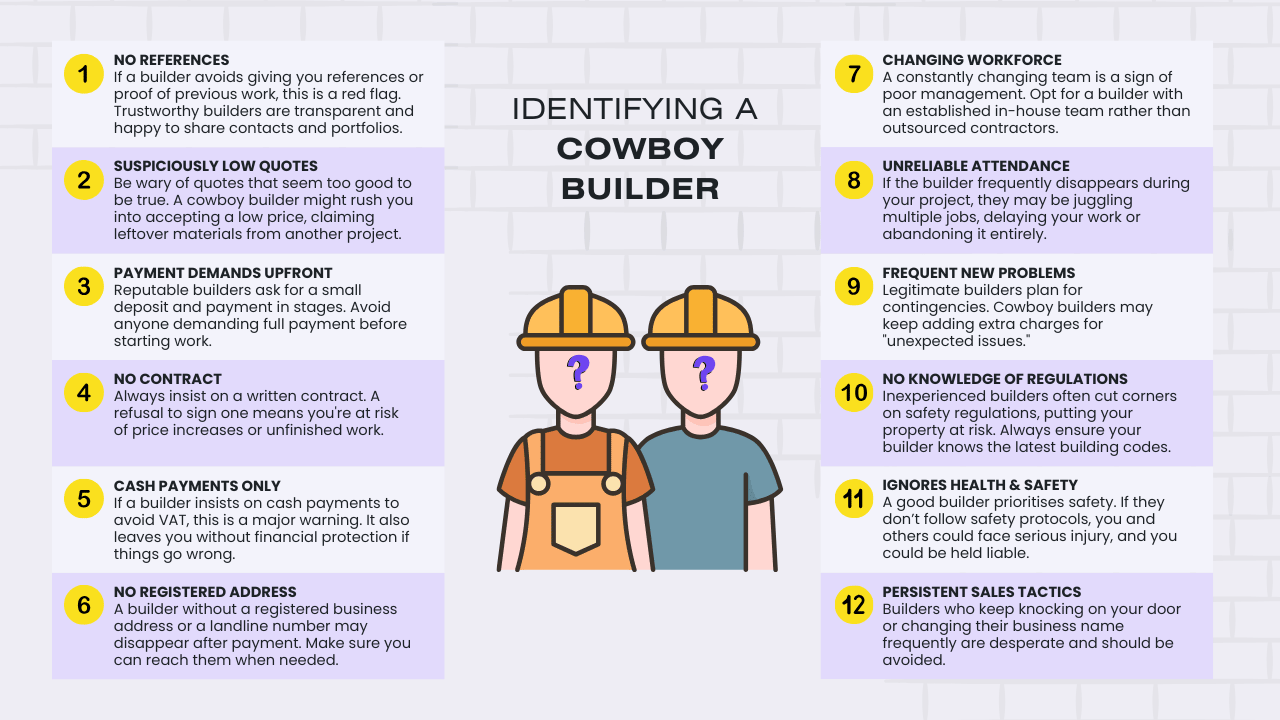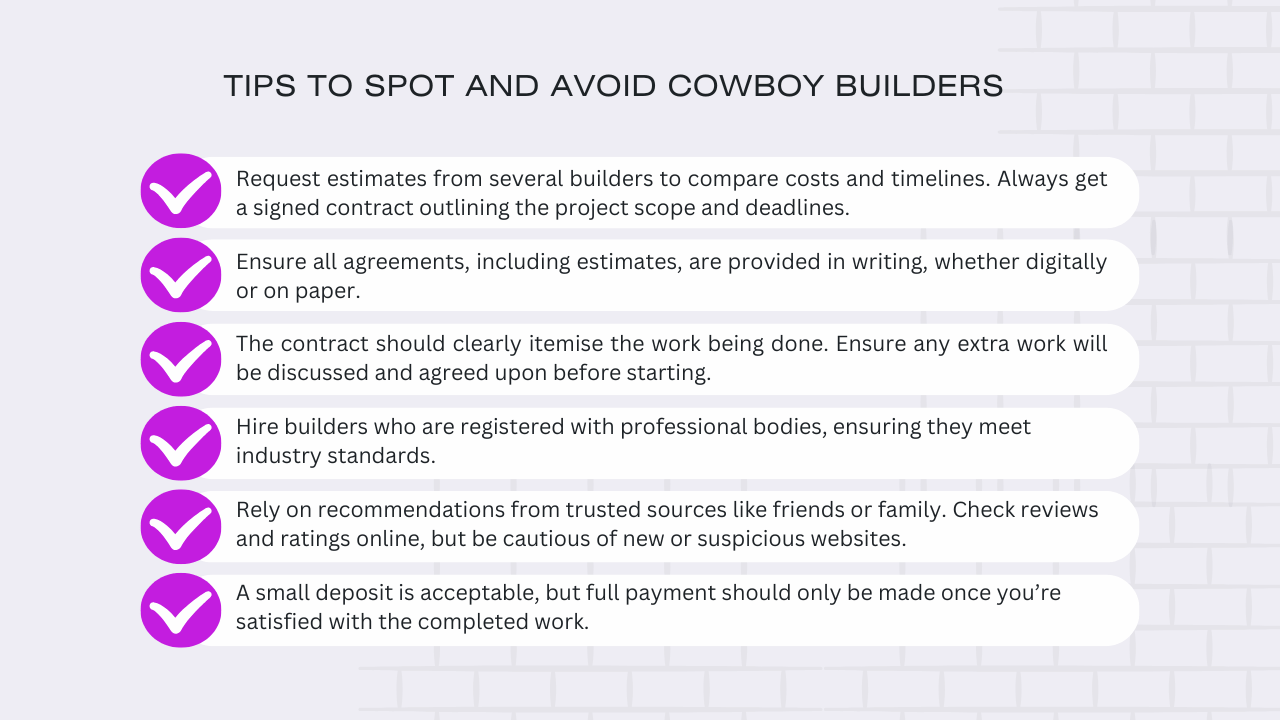
You’ve probably heard horror stories about builders who start a construction job and then disappear after a few days, leaving their clients out of pocket. Sadly, this happens far too often, as cowboy builders exploit legal loopholes to scam unsuspecting homeowners.
Every year, organisations like Action Fraud and Citizens Advice receive thousands of complaints related to builder fraud. Thankfully, TV programmes like Cowboy Builders and Rogue Traders help expose these scam artists, raising public awareness. As a design and build company, we’ve become experts at identifying fraudsters, so here are our 10 tips to help you avoid cowboy builders by breaking down the process into stages.
Understanding legal requirements, such as specific types of insurance, is also crucial in ensuring you hire trustworthy builders.
Introduction to the Problem
The issue of cowboy builders is a significant concern for homeowners in the UK, with many falling victim to rogue traders who carry out poor quality work or abandon projects altogether. According to estimates, 775,500 UK households are left out of pocket by an average of £1,800 each after signing up with cowboy traders to improve their homes. It is essential to understand the problem and take steps to avoid cowboy builders, including researching a builder’s business, checking for public liability insurance, and ensuring a written contract is in place. By being aware of the warning signs and taking the necessary precautions, homeowners can protect themselves from the financial and emotional distress caused by cowboy builders.
Key Takeaways
- Never trust builders who approach you unsolicited.
- Always have a clear and detailed project plan, and ensure you have proof of all agreements in writing.
- Get at least three quotes to compare.
- Check for membership in reputable industry bodies.
- Ensure the builder has Public Liability Insurance.
- Confirm that materials are included in the quote.
- Agree on staged payments and hold back the final payment until you’re satisfied.
- There is a good reason to always obtain written documentation for building work; it helps protect you from rogue traders and ensures all terms are clearly defined.
What Are Cowboy Builders?
The term “cowboy builder” comes from the reputation of cowboys as being careless and untrustworthy. In the construction world, it refers to builders who lack formal training or qualifications and produce substandard work.
These rogue builders often undercut reputable contractors by offering unrealistically cheap quotes, but they deliver poor-quality results. Lacking professional skills and business integrity, they pose a risk to homeowners looking for reliable construction services. It is crucial to verify a builder’s business registration and financial history to ensure their legitimacy and financial stability. Additionally, avoid paying tradespeople upfront in cash, especially when they claim to need money to buy materials. Proper documentation in contracts is essential to prevent potential scams or disputes.

Identifying Rogue Traders
Rogue traders, also known as cowboy builders, are con artists who persuade victims to spend large amounts of money on unnecessary, overpriced, or poor-quality work. They often lack proper training and qualifications, cut corners, and flout building regulations and safety standards. To identify rogue traders, look out for red flags such as unregistered or unlicensed builders, a lack of references or reviews, and an unwillingness to provide a written contract. It is also crucial to research a builder’s business, including checking for a registered business address and verifying their membership with reputable membership organisations. By being vigilant and doing your research, you can avoid falling victim to rogue traders and ensure that your building project is completed to a high standard.
Warning Signs to Watch Out For
When dealing with builders, there are several warning signs to watch out for to avoid cowboy builders. These include high-pressure sales tactics, unusually low quotes, and a lack of transparency about the payment schedule or work progresses. Be wary of builders who ask for cash payments or refuse to provide a written contract, as these are common tactics used by rogue traders. Additionally, check for signs of poor workmanship, such as a lack of attention to detail or a failure to complete work on time. By being aware of these warning signs, you can protect yourself from the risks associated with cowboy builders and ensure that your building project is completed successfully.
How to Avoid Cowboy Builders: Practical Tips for Homeowners
Finding a reliable builder for your project is crucial to avoiding scams and ensuring quality work. Having a building contract in place before work begins is essential to protect your interests and clearly outline the scope of the project. Rogue builders often take advantage of unsuspecting homeowners by offering cheap quotes and pressuring for cash upfront. Paying in cash can lead to significant risks, including lack of proof of payment and limited consumer rights in disputes. Below are 10 essential tips to help you steer clear of cowboy builders and safeguard your investment:
1. Never Trust Cold Callers
If a builder knocks on your door uninvited, offering to fix an issue you didn’t even notice, don’t be tempted. Reputable builders don’t operate this way, and any request for cash upfront is a huge red flag.
Understanding the law regarding cold-calling and homeowners’ rights is crucial to protect yourself from rogue traders.
2. Start With a Specification
Take control of your project by clearly specifying what you want done. This could include architectural plans or a detailed description of the work, right down to the finish of the paint. Being specific helps avoid misunderstandings later. Ensure that all agreements and terms are clearly documented in writing to protect yourself from rogue traders and to have a clear understanding of the scope of work, payments, and project timelines.
3. Always Get 3 Quotes
Scammers thrive on pressuring you into quick decisions. Always get at least three quotes from different builders. Ensure they visit your property so they can provide an accurate estimate based on your requirements.
Additionally, ask potential builders for examples of their completed projects to assess their quality and suitability for your job.
4. Check Out Before Choosing
Even if you’ve received a good quote and the builder seems trustworthy, do your due diligence:
- Check for accreditations like Trustmark, Federation of Master Builders (FMB), or National Federation of Builders (NFB).
- Investigate how long they’ve been in business.
- Look for customer reviews on reliable platforms like TrustaTrader, Google, or Facebook.
- Contact previous customers for recommendations to verify the builder’s credibility and authenticity.
5. Agree on a Payment Schedule
It’s normal for contractors to ask for a deposit—around 30% is reasonable. However, hold back a certain amount of the final payment until a few weeks after completion, giving you time to inspect the work and ensure everything is up to standard.
6. Discuss Insurance
A trustworthy building contractor will hold Public Liability Insurance. This guarantees that any injury sustained on site is covered (including builders, the public or family family members), as well as any damage to the property.
7. Ensure Materials are Included in Quote
An eye-catching quote can sometimes be low because it doesn’t include materials. Double-check exactly what’s covered in the quote and what isn’t.
Additionally, avoid paying upfront for materials and ensure all payments are properly documented to protect your consumer rights.
8. Trust Your Instincts
Even after you’ve made all your checks, you should take a step back and consider how you feel about a particular builder. This is someone who will spend a reasonable amount of time in your home, so if you have any doubts, look elsewhere.
Recognizing the telltale signs of a cowboy builder is crucial to avoid potential issues and ensure you hire a trustworthy professional.
9. Agree on a Deadline
Don’t assume that a builder will naturally get the work done as quickly as possible. You need to negotiate a reasonable deadline. This should include leeway for unavoidable delays such as bad weather or illness. Clarity on your deadline, as part of your signed agreement, is important, as is having a clear understanding of when work begins to ensure all parties are on the same page.
10. If You Sense There’s a Problem
If a builder is an experienced cowboy, it’s likely that once they have your money, there’s little you can do about retrieving it. Many scammers set up Ltd companies and then liquidate if pursued through the courts. You can report them via The Dept of Trading Standards, Citizens’ Advice and Action Fraud.

For claims under £10,000, the small claims court is a viable option for recovering funds from builders, as the process is designed to be straightforward and economical.
Looking for a No Risk Approach to Finding a Builder?
Construction Supermarket exists to kick the fraud out of the construction sector. They put clients in touch with verified builders in their area. The company ensures that no payment is released until the work has been checked by an independent Quality Surveyor. Finding good builders with proper insurance and credentials is vital for the success of any project, and effective management during the tendering process is essential for a smooth construction experience.
Conclusion
Avoiding cowboy builders is about being informed and cautious. Follow the above tips to minimise the risk of hiring a fraudulent contractor and ensure your building project goes smoothly. Bear in mind specific factors when dealing with builders, such as their character and capabilities. Taking the time to research, check qualifications, and agree on clear terms with your builder will save you stress, time, and money in the long run. A legitimate builder should possess a thorough knowledge of building regulations and standards to ensure safety and compliance, which ultimately affects future property sales and the quality of work.
Frequently Asked Questions
How can I verify a builder’s credentials?
Check for membership in trusted trade organisations like Trustmark or the Federation of Master Builders. Also, look for customer reviews on reputable platforms like TrustaTrader or Google.
Is it normal to pay a deposit upfront?
Yes, a deposit of around 30% is standard. However, always hold back the final payment until the project is completed and thoroughly checked.
What should be included in a builder’s quote?
The quote should cover all aspects of the work, including materials, labour, and any additional costs. Make sure it’s detailed and that both parties understand what’s included.
What do I do if I suspect I’ve hired a cowboy builder?
If you feel you’ve been scammed, report the builder to Trading Standards, Action Fraud, or Citizens Advice. They can guide you on the next steps to recover your money or take legal action.
Why is it important to have a contract?
A contract protects both you and the builder by clearly outlining the scope of work, timelines, and payment terms. It helps prevent disputes and ensures accountability.

